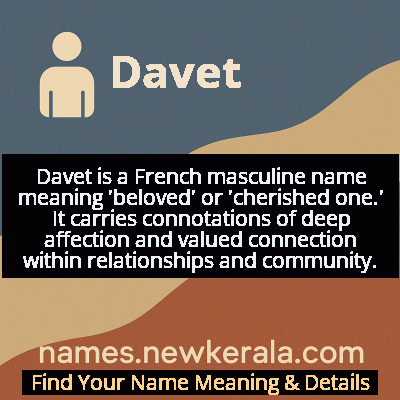Davet Name Meaning & Details
Origin, Popularity, Numerology Analysis & Name Meaning of Davet
Discover the origin, meaning, and cultural significance of the name DAVET. Delve into its historical roots and explore the lasting impact it has had on communities and traditions.
Name
Davet
Gender
Male
Origin
French
Lucky Number
7
Meaning of the Name - Davet
Davet is a French masculine name meaning 'beloved' or 'cherished one.' It carries connotations of deep affection and valued connection within relationships and community.
Davet - Complete Numerology Analysis
Your Numerology Number
Based on Pythagorean Numerology System
Ruling Planet
Neptune (Ketu)
Positive Nature
Intuitive, analytical, spiritual, and inquisitive.
Negative Traits
Secretive, reserved, aloof, and can be overly critical.
Lucky Colours
Green, yellow.
Lucky Days
Monday.
Lucky Stones
Cat’s eye, moonstone.
Harmony Numbers
1, 5, 6.
Best Suited Professions
Scientists, researchers, spiritual leaders, detectives.
What People Like About You
Depth of knowledge, analytical skills, spirituality.
Famous People Named Davet
Davet Gensac
French politician
Served as Deputy of Gironde and contributed to regional development policies
Davet de la Fouchardière
French writer
Known for satirical works and contributions to French literary journalism
Jean-Davet
French artisan
Renowned master clockmaker with preserved timepieces in French museums
Name Variations & International Equivalents
Click on blue names to explore their detailed meanings. Gray names with will be available soon.
Cultural & Historical Significance
Extended Personality Analysis
The name Davet is associated with a personality that blends warmth with strength, reflecting its meaning of 'beloved.' Individuals with this name are often perceived as deeply loyal and emotionally present, making them natural pillars in their relationships and communities. They tend to possess a quiet confidence that comes from being grounded in their values and heritage, combined with an open-mindedness that allows them to adapt to changing circumstances. This creates a compelling balance between tradition and progressiveness. Davets are typically good listeners who offer thoughtful advice, and they often excel in roles that require both empathy and practical problem-solving. Their French origins suggest an appreciation for beauty, culture, and the finer things in life, while their regional roots indicate practicality and resilience. This combination makes them equally comfortable in artistic pursuits and practical endeavors, able to find meaning and satisfaction in both creative expression and tangible achievements. Their personality is often characterized by a genuine authenticity that draws others to them and creates lasting bonds.
Modern Usage & Popularity
In contemporary naming practices, Davet occupies a unique position as a traditional French name that remains relatively uncommon, giving it an air of distinction without being overly exotic. While its usage has declined from its historical peaks, it maintains a steady presence particularly in southwestern France where families continue the tradition of passing down regional names. The name has benefited from recent trends favoring unique traditional names and the celebration of regional heritage, though it remains far less common than its English counterpart David. Modern parents who choose Davet often do so to honor French ancestry or to select a name with historical depth and cultural specificity. The name's rarity in global contexts makes it an appealing choice for families seeking something distinctive yet firmly rooted in established naming traditions. Current usage patterns show it appearing most frequently in France, with occasional use in French-speaking communities abroad, particularly in Quebec and other areas with strong French cultural connections.
Symbolic & Spiritual Meanings
Symbolically, Davet represents the enduring nature of love and connection across time and generations. As a name meaning 'beloved,' it carries profound symbolic weight related to affection, value, and emotional significance within human relationships. The name symbolizes how individuals can be both products of their heritage and unique expressions of personal identity—carrying forward the love of previous generations while creating new bonds in their own time. Metaphorically, Davet represents the idea of being cherished not just for personal qualities but as part of a continuous chain of human connection. Its French provincial origins add symbolic dimensions of authenticity, cultural preservation, and resistance to homogenization. The name suggests someone who embodies traditional values while engaging with the modern world, making it a symbol of continuity amid change. In a broader sense, Davet represents the human need for meaningful connection and the ways in which names can carry forward the essential human experiences of love, belonging, and identity across centuries.

